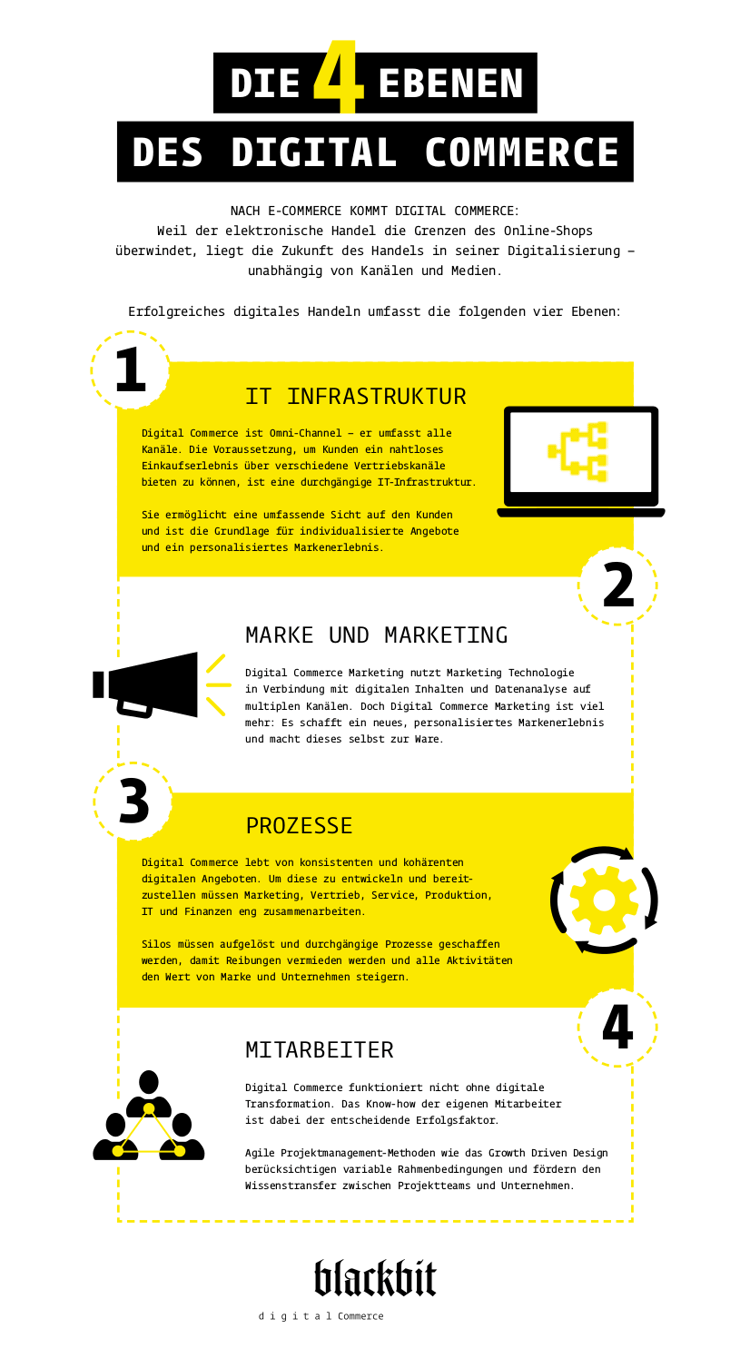Consulting the online shopping list in the supermarket, ordering clothes from the comfort of your couch via tablet and picking them up in shop or ordering a food box including recipes to take home online - more and more consumers are favouring a combination of online and offline purchases. It is not important to customers which channels they use to get the products they want, but rather that they are offered a convenient, seamless shopping experience.

The strict separation between offline and e-commerce no longer exists. Instead, we are now talking about digital commerce. Because no matter where products or services are traded - nothing takes place outside the technologised sphere.
What is digital commerce?
The Gartner IT Glossary defines digital commerce as follows:
"Digital commerce is the buying and selling of goods and services using the Internet, mobile networks and commerce infrastructure. It includes the marketing activities that support these transactions, including people, processes and technologies to execute the offering of development content, analytics, promotion, pricing, customer acquisition and retention, and customer experience at all touchpoints throughout the customer buying journey."
Digital commerce therefore involves far more than just operating an online shop. It requires a comprehensive, data-driven marketing strategy as well as the appropriate, linked technology and channels (email, social media, search engine marketing, apps, etc.) to provide consumers with relevant content at all digital touchpoints and guide them along the buyer's journey.
Based on our agency experience, we have expanded Gartner's definition and summarised our understanding of digital commerce in an infographic. We see the four cornerstones of digital commerce as being an end-to-end IT structure, personalised marketing, smooth processes across all areas of the company and employees who are constantly expanding their expertise and sharing their knowledge across teams:
How do you master the challenges of digital commerce?
To be successful in digital commerce, it is not enough to utilise as many sales channels as possible. You need to serve the channels relevant to your target group (buyer personas) with the right content and combine the customer's online and offline experiences with your brand to create an uninterrupted shopping experience.
We have summarised here what customers generally expect from retailers today and how you can fulfil these requirements:
- Easily accessible information → Make content conveniently available wherever your customers search for it (in the shop optimised for desktop and mobile view, via search engines, on the social web or in-store).
- Consistent, up-to-date information from touchpoint to touchpoint → A centrally maintained, constantly updated database is crucial to ensure that customers do not receive outdated information and that no products are advertised that are currently out of stock.
- Individually relevant content → Track interactions across sessions/devices and always take the current status of the customer journey into account when addressing customers. For example, there is no point in bothering a customer with adverts for products that they have already bought or that do not meet their current needs.
- No interruptions at checkout → Make the checkout as simple as possible, regardless of which device your customer is using to make a purchase or whether they switch platforms during the checkout process.
- Fast delivery/accessibility of products → Offer alternative delivery options, such as pick-up at the desired shop or at 24/7 accessible lockers near the customer.
Digital commerce requires new structures in all areas of the company
Unfortunately, working through a short checklist is not enough. If you want to offer customers a seamless shopping experience, you have to rethink and create new structures in many areas of the company. It may be necessary to redefine company goals and the target group in more detail. The permanent analysis of user data plays a central role in order to react quickly to current customer preferences. Close cooperation between the IT, marketing and sales departments is just as important as the constant expansion of expertise. After all, customer preferences for information channels and sales channels can change quickly. Just like technologies or data protection guidelines.
Get support from digital commerce experts
As a digital commerce agency, Blackbit supports you in successfully entering this new type of commerce. From strategic consulting and initial project management to the realisation of a digital commerce foundation and its continuous further development through to hosting and support - find out more about our comprehensive digital commerce services here:
Do you have any questions or would you like a personal consultation?
From SEO to GEO: How SMEs can stay visible in AI search - an interview with Stefano Viani
Webinar Server-side tracking: How to stop data loss in marketing
Withdrawal button: Mandatory for many online stores
Why your website doesn't show up in ChatGPT & Co. and what you need to do now for AI visibility

Leave us feedback